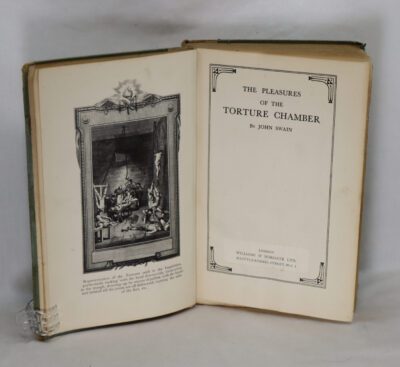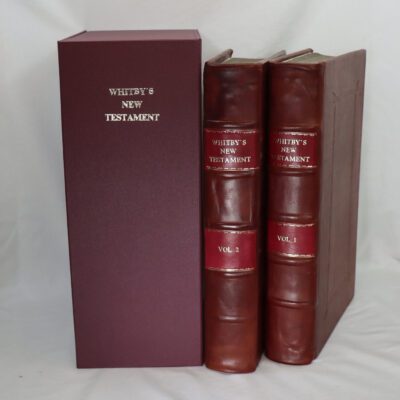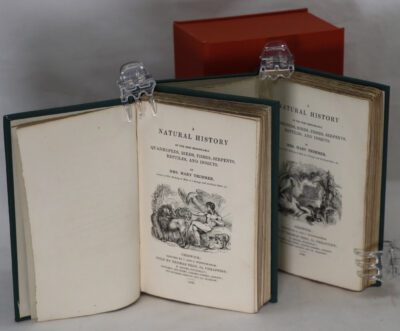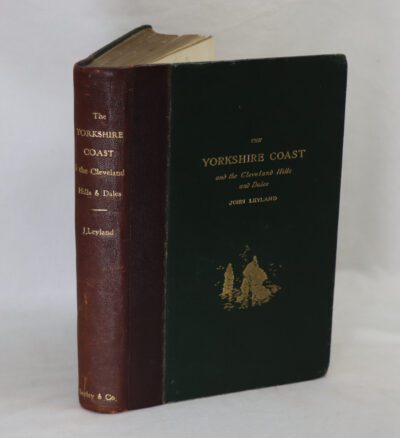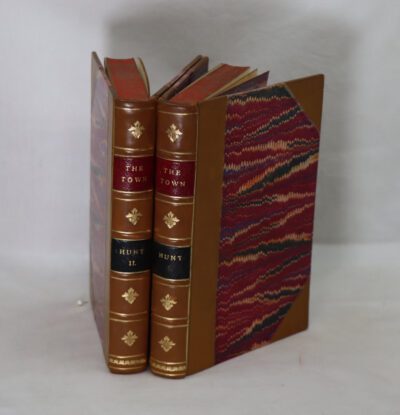Lytton's Works. The Coming Race. Etc.
By Lord Lytton
Printed: 1878
Publisher: George Routledge & Sons. London
| Dimensions | 16 × 22 × 4 cm |
|---|---|
| Language |
Language: English
Size (cminches): 16 x 22 x 4
Condition: Fine (See explanation of ratings)
Item information
Description
Tan leather spine and corners. Brown marbled boards. Red and green title plates with gilt lettering, banding and shell emblems on the spine.
A very nicely bound book
Sometimes viewed as a precursor to Nazi beliefs
Edward George Earl Bulwer-Lytton, 1st Baron Lytton (1803–1873) was a novelist, playwright, and politician. He was a popular writer of his day, who coined such phrases as “the great unwashed”, “pursuit of the almighty dollar” and “the pen is mightier than the sword”. Despite the popularity in his heyday, today his name is known as a byword for bad writing and his opening line “It was a dark and stormy night “has been a source of ridicule in modern times.
He was the youngest son of General William Earle Bulwer of Heydon Hall and Wood Dalling, and Elizabeth Barbara Lytton, daughter of Richard Warburton Lytton of Knebworth, Hertfordshire. He had two brothers, William (1799-1877) and Henry (1801-1872), afterwards Lord Dalling. In 1838 Bulwer, then at the height of his popularity, was created a baronet, and on succeeding to the Knebworth estate in 1843 added Lytton to his surname, under the terms of his mother’s will. His son, Edward Robert Bulwer-Lytton, 1st Earl of Lytton (1831-1891) was viceroy of India from 1876 to 1880. His daughter, Lady Emily Lytton, married architect Sir Edwin Lutyens. Robert became a well-known poet and author, writing under the pseudonym of Owen Meredith. His writings were based on the literature of foreign countries that he lived in as a diplomat. His godson, the critic and writer Lytton Strachey, was named after him.
Edward George Bulwer-Lytton’s literary career began in 1820, with the publication of his first book of poems, written at the age of fifteen, and spanned much of the nineteenth century. He wrote in a variety of genres, including historical fiction, mystery, romance, the occult and science fiction. In 1828 he attracted general attention with Pelham, an intimate study of the dandyism of the age that kept gossips busy in identifying the characters with the leading men of the time. By 1833, he had reached the height of his popularity with Godolphin, followed by The Pilgrims of the Rhine (1834), The Last Days of Pompeii (1834), Rienzi (1835), and Harold: Last of the Saxon Kings (1848). He also wrote stories of the occult, including The Haunted and the Haunters (1857) and Vril: The Power of the Coming Race. The latter was one of the first science fiction novels. Pelham had been partly inspired by Benjamin D’Israeli’s first novel and the two authors and politicians became friends.
Bulwer-Lytton’s literary career began in 1820 with the publication of a book of poems and spanned much of the 19th century. He wrote in a variety of genres, including historical fiction, mystery, romance, the occult, and science fiction. He financed his extravagant way of life with a varied and prolific literary output, sometimes publishing anonymously.
Bulwer-Lytton published Falkland in 1827, a novel which was only a moderate success. But Pelham brought him public acclaim in 1828 and established his reputation as a wit and dandy. Its intricate plot and humorous, intimate portrayal of pre-Victorian dandyism kept gossips busy trying to associate public figures with characters in the book. Pelham resembled Benjamin Disraeli’s first novel Vivian Grey (1827). The character of the villainous Richard Crawford in The Disowned, also published in 1828, borrowed much from that of banker and forger Henry Fauntleroy, who was hanged in London in 1824 before a crowd of some 100,000.
Bulwer-Lytton admired Disraeli’s father Isaac D’Israeli, himself a noted author. They began corresponding in the late 1820s and met for the first time in March 1830, when Isaac D’Israeli dined at Bulwer-Lytton’s house. Also present that evening were Charles Pelham Villiers and Alexander Cockburn. The young Villiers had a long parliamentary career, while Cockburn became Lord Chief Justice of England in 1859.
Bulwer-Lytton reached his height of popularity with the publication of England and the English, and Godolphin (1833). This was followed by The Pilgrims of the Rhine (1834), The Last Days of Pompeii (1834), Rienzi, Last of the Roman Tribunes about Cola di Rienzo (1835), Ernest Maltravers; or, The Eleusinia (1837), Alice; or, The Mysteries (1838), Leila; or, The Siege of Granada (1838), and Harold, the Last of the Saxons (1848). The Last Days of Pompeii was inspired by Karl Briullov’s painting The Last Day of Pompeii, which Bulwer-Lytton saw in Milan.
His New Timon lampooned Tennyson, who responded in kind. Bulwer-Lytton also wrote the horror story The Haunted and the Haunters; or, The House and the Brain (1859). Another novel with a supernatural theme was A Strange Story (1862), which was an influence on Bram Stoker’s Dracula.
Bulwer-Lytton wrote many other works, including Vril: The Power of the Coming Race (1871) which drew heavily on his interest in the occult and contributed to the early growth of the science fiction genre. Its story of a subterranean race waiting to reclaim the surface of the Earth is an early science fiction theme. The book popularised the Hollow Earth theory and may have inspired Nazi mysticism. His term “vril” lent its name to Bovril meat extract. The book was also the theme of a fundraising event held at the Royal Albert Hall in 1891, the Vril-Ya Bazaar and Fete. “Vril” has been adopted by theosophists and occultists since the 1870s and became closely associated with the ideas of an esoteric neo-Nazism after 1945.
His play Money (1840) was first produced at the Theatre Royal, Haymarket, London, on 8 December 1840. The first American production was at the Old Park Theatre in New York on 1 February 1841. Subsequent productions include the Prince of Wales’s Theatre’s in 1872 and as the inaugural play at the new California Theatre (San Francisco) in 1869.
Among Bulwer-Lytton’s lesser-known contributions to literature was that he convinced Charles Dickens to revise the ending of Great Expectations to make it more palatable to the reading public, as in the original version of the novel, Pip and Estella do not get together.
Want to know more about this item?

Related products
Share this Page with a friend



